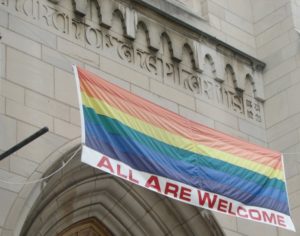The Methodist Split: LGBTQ Inclusion vs. Scriptural Adherence
On January 3, 2020, the United Methodist Church announced that after several rounds of mediation, it has crafted a plan to split in two. The reason: irreconcilable differences over LGBTQ inclusivity.
In February of last year, at a special General Conference in St. Louis, Missouri, church leaders and other delegates voted 438-384 (a 53 percent majority) to maintain the denomination’s bans on same-sex marriage and LGBTQ clergy. Known as the “Traditional Plan,” the vote upheld the statute in the Methodist Book of Discipline that says “self-avowed practicing homosexuals” must be excluded in these ways. It also added stricter penalties for clergy who perform same-sex wedding ceremonies: suspension for the first wedding performed and removal for the second.
Many American Methodists were shocked at the results. Support for permitting same-sex marriage and LGBTQ clergy has grown significantly over the years, with 54 percent of Methodists favoring legal and church-recognized same-sex marriage. Younger Methodists, including those on UMC-affiliated campuses like American University here in Washington, DC, are especially vocal in their commitment to inclusion.
In the days following the vote, for example, the vice president of campus life and inclusive excellence at American University, Fanta Aw, sent a letter to the AU community to address people’s anguish over the Traditional Plan. She pledged ongoing consideration of reasonable action the school might take to maintain AU’s commitment to inclusion. AU President Sylvia Burwell agreed:
American University has always celebrated the Methodist values of a love of learning, service to others and inclusion for all. We embrace the human dignity of all, regardless of their race, creed, gender, gender identity or expression, sexual orientation, or national origin.
Nearly one hundred university presidents from the National Association of Schools and Colleges of the United Methodist Church (which includes AU, Boston University, Duke, Syracuse, and many other prominent colleges and universities across the country) issued a joint statement urging the UMC to move away from its conservative stance on LGBTQ participation, while the UMC publication Insight reported that “most United Methodist seminaries in the US that train clergy were on the side of inclusion.”
Along with Methodist-affiliated schools, churches across the country lamented the discriminatory vote and wondered what they’d do.
So how did things turn out as they did? It seems support for LGBTQ inclusion is higher among the roughly 6.8 million Methodists in the United States than it is among a similar number of Methodists around the world. According to the New York Times, UMC congregations are growing faster overseas—in Europe, the Philippines, and especially in Africa—where the institutions favor a more conservative doctrine. More than 40 percent of the voters at the General Conference in St. Louis were international delegates.
Of course, these international voices weren’t the only ones who wanted to maintain the ban and to enforce punishment for UMC congregations that perform same-sex weddings or admit LGBTQ clergy. WAMU, American University’s radio station, quoted a gay student from the Wesley Theological Seminary who attended the February 2019 conference: “One of the delegates from Pennsylvania stood up and implied that gay people should be drowned using scripture.”
Enter attorney Kenneth Feinberg, the well-known mediator who handled victim compensation funds related to the 9/11 terror attacks and the BP oil spill of 2010. From October through December, Feinberg worked with some sixteen UMC leaders representing the Central Conference Bishops, Traditionalists, Centrists, and Progressives to craft the “Protocol of Reconciliation & Grace Through Separation.” Announced January 3, it creates a process for the split and allocates financial assets, allowing the more liberal, LGBTQ-inclusive churches to remain as UMC congregations and force the more conservative faction to spin off and incorporate as their own denomination. (According to the Times, the new traditionalist group will get $25 million over four years to go their separate way.) The protocol also allocates $39 million for denominations in “communities historically marginalized by the sin of racism” and allows all current clergy and lay employees to keep their pensions.
The split will be officially voted on at the next UMC General Conference in Minneapolis in May. According to leaders quoted in the Times, the plan is expected to pass, after which individual churches will have to decide whether to stay or go. However, numerous comments online, including on the Facebook page of Wesley Theological Seminary, suggest that not all Methodists are so sure it’ll pass, nor do they necessarily wish it to. An article by Carl R. Trueman published yesterday at First Things characterizes the proposed split as “strange.” (“To fight over same-sex marriage while tolerating heresy on foundational doctrines is to make oneself vulnerable to the charge of being motivated less by fidelity to the Christian faith and more by homophobia.”) Commenters note the liberal position on LGBTQ inclusion is a departure from what “scripture says about homosexuality.” Others are crowing about how there are already hundreds of gay clergy in the UMC and at Methodist seminaries, and that LGBTQ Methodists are playing the victim and making an unnecessary stink over official recognition.
For a humanist or anyone concerned with human dignity, none of this is pleasurable to watch unfold. And the United Methodist Church will face many thorny decisions going forward. What will seminaries and schools with UMC ties teach, for example? (I reached out to the Wesley Theological Seminary to ask but did not get a response.) Even so, we can be heartened by the unfolding evolution toward justice for marginalized Methodists. We can be resolute in our own rejection of any form of theology and still find something to applaud in a religion grappling with progress.

